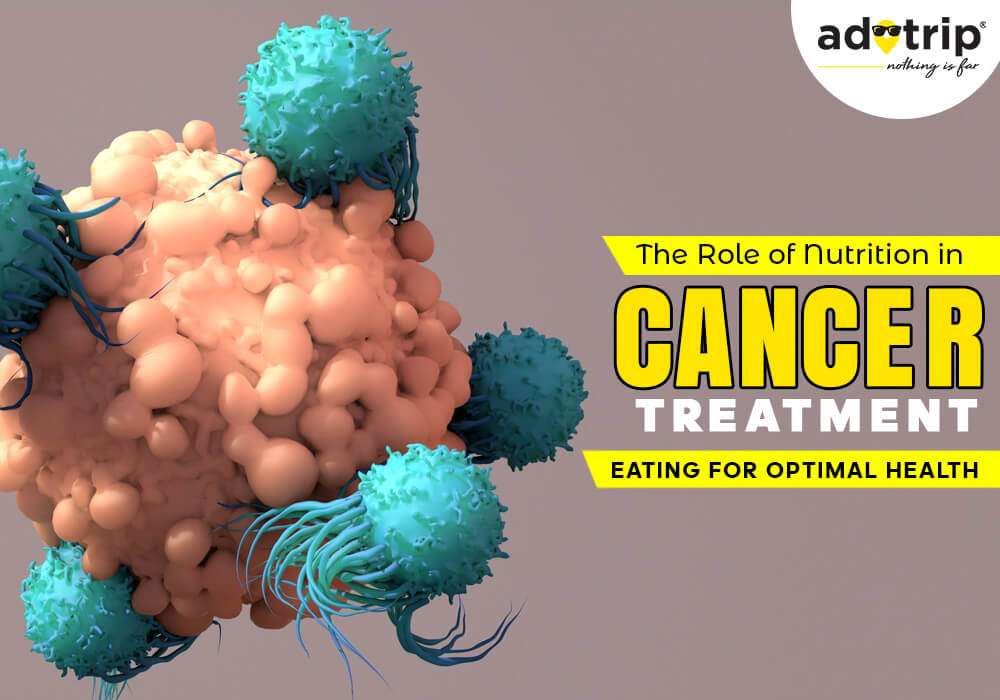
Nutrition plays a vital role in maintaining good health. Our ancestors suggested that we eat right to avoid health issues. Nutrition is all about providing the required micronutrients to your body through food for cellular energy, growth, and tissue repair. But can nutrition help prevent serious health problems like cancer? The answer to this question is "yes". According to some studies, the prevalence of cancer reduces by 20% in people who consume a diet rich in fruits, vegetables, whole grains, low-fat dairy products, and lean proteins.
Cancer affecting the stomach, intestines, pancreas, liver, head, food pipe, or neck can lead to various nutrition-related problems. Moreover, cancer and its treatment procedures can lead to difficulty swallowing and loss of appetite (anorexia). In such a situation, the person may suffer from various deficiencies. Moreover, if the patient is obese or alcoholic, the risk of such problems rises. Cancer tumours don't leave space to store fat and muscle in the cells. As a result, it causes sudden weight loss or muscle weakness (cachexia).
Furthermore, some tumours tend to absorb specific nutrients. The patient may seem to eat well, but their body isn't getting enough nutrients. According to some studies, around 40% of cancer patients experienced a decrease in appetite, 30% reported eating less, and 30.6% experienced an increase in thirst during cancer treatment.
Due to cancer, the patient becomes malnourished. Hence, the energy requirements may increase by 25% or more. So, nutrition plays a crucial role before and during cancer treatment. The diet provides the required nutritional support for our treatment and immunity to defeat cancer.
This treatment is suggested to remove solid tumours. But its process requires high nutrient and energy levels as it is a highly invasive approach. Moreover, suppose the surgical site is close to the neck. In that case, the appetite is directly triggered by the food pipe, head, stomach, or any other organ related to the digestive system. Hence, nutritional requirements are spiked.
During chemotherapy or hormone therapy, the doctor uses high levels of drugs to subside cancer progression and symptoms. It causes nausea, vomiting, constipation, diarrhoea, and other side effects. Thus, one needs to consume a diet that can help alleviate these side effects. Therefore, every patient can have a unique set of nutrient requirements.
Like other cancer treatment options, this approach can also lead to side effects like nausea, vomiting, etc. Moreover, suppose the radiation is performed near the neck or stomach. In that case, it may lead to many other consequences, like dry throat, dental problems, dry mouth, etc. Therefore, the nutritional requirements change.
It is a treatment that focuses on improving the patient's immunity. But it can alter the sense of taste and lead to diarrhoea, a sore mouth, anorexia, and other side effects. Hence, the patient needs special attention to nutrition to support the treatment and alleviate these side effects.
The side effects and nutritional requirements during this treatment depend on the patient's condition. Therefore, every patient may have some special needs for the same.
The right nutrition is essential for everyone. Regarding a cancer patient, following the right nutrition becomes difficult due to the side effects. The list of its benefits includes:
The nutritional requirements of every cancer patient may differ according to the present health condition. But some key nutrients should be present in the diet. These are:
Proteins are important for cellular production and repair. Moreover, the protein requirements of a cancer patient are slightly higher than those of normal people because they need the ability to repair damaged cells or replace them with new healthy cells. Some of the rich sources of protein are:
It is a vital nutrient that fuels the body with energy. Carbohydrates are responsible for sourcing energy to perform all physical activities. Cancer patients tend to experience fatigue and thus need more carbohydrates than usual. Its prime sources are:
This nutrient is responsible for storing energy in the cells, carrying other nutrients in the blood, and insulating tissues. Moreover, the levels and types of fats play an important role in health. Cancer patients should avoid trans fats and over-saturated fats. Furthermore, they should opt for mono-saturated and poly-saturated fats. Its sources are:
Hydration is important for cancer patients; thus, they should consume enough water and fluids. A deficiency of fluids can lead to dehydration, further worsening the condition. Furthermore, side effects of cancer treatment, like diarrhoea and vomiting, can cause a lack of fluid intake. Hence, consume enough water.
To utilise all the calories consumed, one needs several vitamins and minerals. You can get the same effect by eating fruits and vegetables. But according to your requirements, your oncologist may prescribe you some multivitamin supplements for the same. Phytonutrients are plant compounds and consist of substances like carotenoids, resveratrol, phytosterols, and lycopene. It helps improve the health-protecting functionalities of the body.
Nutrition is vital for cancer patients during cancer treatment to attain the maximum benefits of the treatment. One needs to remember some do's and don'ts during the treatment. However, the exact diet plan depends on several factors, including the current condition, the severity of cancer, and the treatment approach. Kindly discuss the same with your doctor.
If you are looking forward to getting the best cancer treatment in India, Adotrip, a leading medical tourism company, will help you plan your trip. From travel bookings to stay arrangements, doctor appointments to ambulance services and more are available under one roof.




